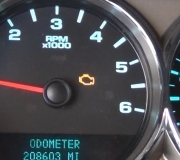My concern is not really what you did or didn't do. It is that I read too often that mechanics get the blame for everything that happens to a car after they do any work on it. There are bad mechanics just like there are bad doctors, bakers, accountants, and teachers, but mechanics are held to the highest standards and the entire industry gets a bad reputation from the few bad ones. While there's always the possibility your mechanic caused some damage, given the description of the events, I think it is more related to 1) unfortunate timing, 2) a mechanic who understands cars but not how to explain problems to people, and 3) a car owner who doesn't understand the complex operation of the vehicle's systems. When the first one happens, mechanics get blamed, usually unfairly. When the second one happens, people can "hear" the wrong information even though the mechanic might know what he's doing. Good mechanics with good customer skills tend to be promoted away from fixing cars leaving just good mechanics who can't explain things very well so you can understand them. As for the third problem, cars are so unnecessarily complicated today that no one can be an expert on every system on every model when they keep changing every year. Doctors have it easy. They only have to learn two models in varying sizes. That never changes. Since it is impossible for mechanics to understand everything about every car, how can an owner be expected to know more about their car than the mechanic? As for the overheating problem, a head gasket either leaks or it doesn't. One day coolant can be getting drawn into the engine and burned but the day before the engine would have run fine. There is no way to know when that is going to happen except to say that it's more common on some cars than others. It is more common on newer cars because the the engine block is still made of cast iron but the cylinder heads are made from aluminum to save weight. Those are the three main parts of the engine that everything else is attached to. Because they are made from different materials they expand at different rates when they heat up. That makes the head gaskets' job real difficult. To make it worse, a corroded head gasket that starts to leak unexpectedly can lead to overheating, OR, overheating can lead to warped cylinder heads that prevent the gaskets from sealing. Either one can cause the other. When you KNOW the engine is overheating, the proper thing to do is turn it off and let it cool down. But if the head gasket started leaking first, there is nothing you can do to prevent that. Without knowing all the details of the last mechanic's inspection, I can only suggest that normally an entirely new engine, used engine, or even a total rebuild is not required. Replacing head gaskets and having the cylinder heads checked for warpage and cracks is normally sufficient and is a very common repair although it can be somewhat expensive. For some engines this is a common problem; for some it's not so common so it's impossible to know when this might occur. There is a test mechanics can perform at the radiator to check for one type of head gasket leak when it is still small, but that is normally done in response to symptoms or running problems that are already occurring.
Wednesday, March 23rd, 2011 AT 2:05 AM


